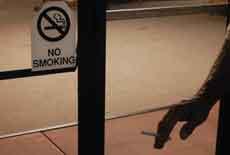Individuals on Nicholls’ campus will no longer be able to use tobacco products in and within 25 feet of University buildings, including residence halls, and on University sidewalks, according to Eugene Dial, Vice President for Student Affairs and Enrollment Services.This new policy is one of the steps the University is taking to make Nicholls a healthier campus.
Dial said that this is a logical negotiation and that “the original recommendation suggested zero use of tobacco products on campus.”
The report on the new policy was submitted for review to the Student Government Association, the Faculty Senate and the Classified and Unclassified Employee Advisory Committees. The President’s cabinet considered the comments that were submitted by these organizations when it adopted the policy, according to Dial.
“All four groups came back and said they understood the need to eliminate smoking, but there had to be some compromise,” Dial said. “There are a lot of people on campus who might have felt differently.”
After taking feedback from all of the groups, Dial said that it was decided that an appropriate approach at this point would be to make sure that individuals can go about their regular campus activities without being subject to the use of tobacco products.
“Most smokers I talk to don’t want to be in a situation where they’re bothering someone else,” Dial said.
There will be no designated areas for those who choose to use tobacco products on campus. Dial said that if individuals want to smoke, they should not be within 25 feet of any building or on a sidewalk.
If students choose to violate the new policy, the student judicial office on campus will handle the situation since it would be a violation of the Code of Student Conduct. If faculty or staff members violate the policy, they will be referred to their supervisor and the human resources department.
“We’re hoping that people realize it’s an attempt to try to have a healthy campus environment while respecting the interests and needs of those who do smoke,” Dial said. “At this point it’s a reasonable compromise, but hopefully no additional action will be needed if everybody’s reasonable about it.”
According to statistical data collected via the Nicholls Tobacco Control Survey conducted in Fall 2005, 36.8 percent of participants have a condition made worse by exposure to second hand smoke. Also, 67 percent of smokers who took the survey want to quit. Eighty-one percent of participants are bothered by exposure to secondhand smoke, and 68 percent of them believe it is dangerous.
The reasons to adopt the new policy are unsightly debris littering the grounds, the presence of secondary students on the University campus everyday, smoky areas at building entrances, community efforts to eradicate tobacco use in public settings and an overall desire to create a safe and healthy environment for students, according to Dial.
“I think this is a very positive step for Nicholls,” Dial said. “I think it addresses concerns that people have about tobacco products while at the same time not just totally prohibiting the whole campus,” Dial said. “Those who use tobacco products can use them in a way that doesn’t harm someone else.”
Dial said he hopes that people look at this as an opportunity to make it better for everybody. He said that, at a University, a higher level of civility and respect is expected from person to person to uphold the University’s new policy.
Along with the new smoking policy, the University also has a few more additions and activities in its steps towards creating a healthier campus.
In the summer, traditional aerobic classes will be available for students, faculty and staff four days a week at no charge, according to Mike Matherne, director of campus recreation. The tennis courts will also be open.
According to Matherne, the two biggest things currently taking place on campus are the new cardio area and walking track.
The cardio area located in the racquetball court will also be open during the summer. Matherne said that campus recreation intends to maintain the cardio areas hours of noon to 11 p.m. Monday through Friday. According to Matherne, about 40 to 60 students, faculty and staff use the cardio equipment a day.
“We’re providing access to equipment that wasn’t here before,” Matherne said. “Before we made the investments in these machines, there were no cardio machines available on campus. We’re glad to bring that to students.”
Matherne said that the walking track has not yet been officially turned over to the University. He said that the contractor is still doing work on it and has until mid-June to complete the project. Although it has not been completed, Matherne said that he has seen many people using the walking track.
The walking track is 1.973 miles long and about 8 feet wide. Part of the path is along Bayou Lafourche and will run down Audubon Drive back towards the hospital and Bowie Road. As of now, the track ends at La Maison Du Bayou.
“I think students have an expectation that certain amenities are going to be available to them when they enroll at a college,” Matherne said. “We’re working harder to provide them.








